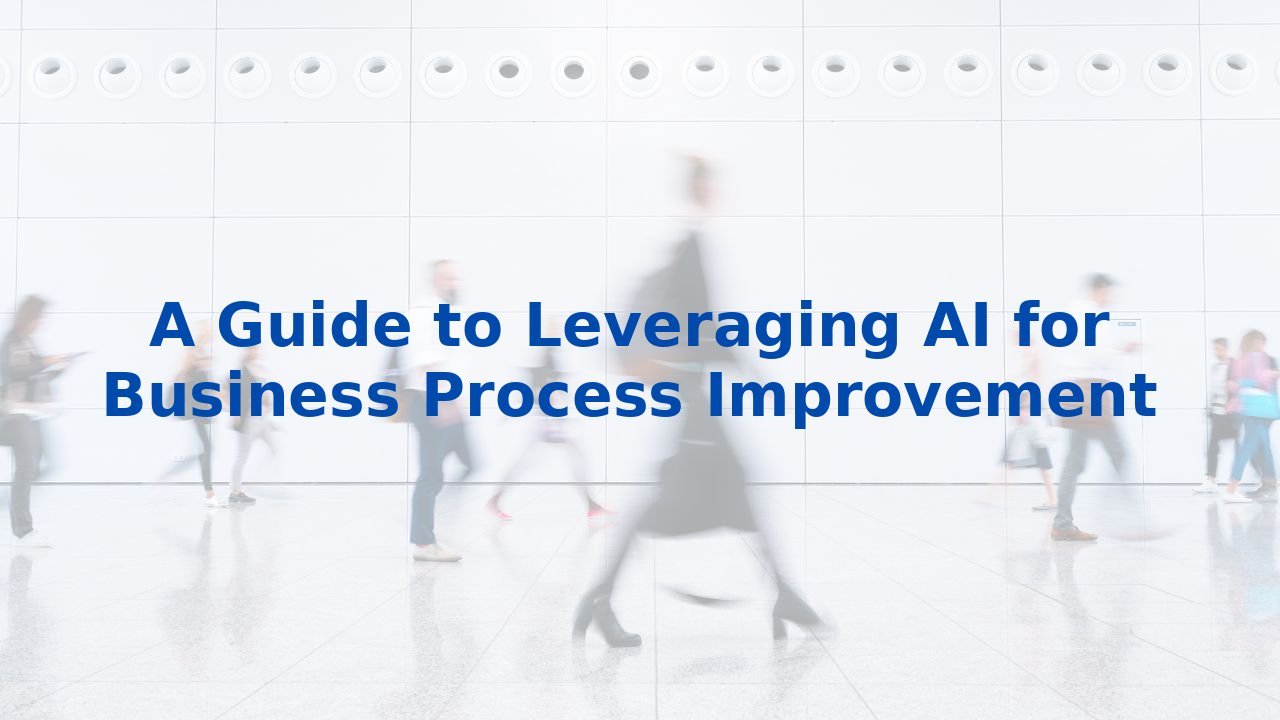A Guide to Leveraging AI for Business Process Improvement
A Guide to Leveraging AI for Business Process Improvement
In today’s fast-paced business environment, evolving and improving operational efficiency is no longer just an option—it’s a necessity. As organizations seek innovative ways to streamline processes and enhance productivity, the integration of Artificial Intelligence (AI) has emerged as a transformative solution. This guide explores how AI can elevate business processes and the profound benefits it brings to efficiency.
The Evolution of Business Process Management
Understanding the evolution of Business Process Management (BPM) is essential. Originally gaining traction in the late 1980s, BPM has become a cornerstone of organizational success, encouraging a systematic analysis, design, execution, and continuous improvement of business processes. However, with the advent of AI, BPM is not just evolving; it’s transforming. Companies can now achieve process optimization more swiftly and effectively than ever before.
How AI Enhances Business Processes
The infusion of AI into BPM is delivering remarkable benefits that empower businesses to operate intelligently and efficiently. Here are some key enhancements AI brings to business processes:
1. Process Simulation and Optimization
AI excels in process simulation by leveraging historical data. By using machine learning algorithms, organizations can identify patterns and dependencies that enhance simulation accuracy. This leads to better calculations of key performance indicators (KPIs) such as process costs and lead times, allowing businesses to foresee bottlenecks and optimize processes proactively.
2. Process Mining and Automation
AI-driven process mining is revolutionizing how businesses analyze and refine workflows. By examining log data, AI uncovers patterns and relationships that visualize process flows, pinpointing deviations or inefficiencies. Moreover, automation through AI enables the execution of repetitive, rule-based tasks via software bots, significantly speeding up operations while minimizing human errors. This creates room for employees to engage in high-impact activities, enhancing overall productivity.
3. Decision-Making and Risk Prediction
Complex decision-making processes often hinge on extensive data. AI aids in this by gathering information from diverse sources and extracting meaningful patterns. This data-driven insight allows decision-makers to evaluate scenarios and potential outcomes, leading to more informed, strategic decisions. In addition, predictive analytics allows organizations to anticipate risks or disruptions, enabling them to cultivate proactive strategies that stave off crises.
4. Customer Service Optimization
In customer-facing roles, AI emerges as a game-changer. From chatbots equipped to tackle basic queries to analyzing feedback for improving service quality, AI optimizes customer interactions significantly. By categorizing incoming requests and inputting them into a ticketing system, AI minimizes response times while prioritizing human intervention when necessary, enhancing the overall customer experience.
The Benefits of AI for Improving Efficiency
Integrating AI into business processes significantly benefits organizations in various ways:
- Faster Results: With AI-driven automation, organizations can achieve expedited outcomes, efficiently analyzing data in real-time.
- Informed Decision-Making: Predictive analytics empower leaders to make data-based decisions, minimizing risk and uncertainty.
- Heightened Efficiency: Repetitive task automation decreases errors, allowing teams to focus on strategic initiatives.
- Proactive Risk Management: AI’s ability to predict scenarios safeguards organizations against potential bottlenecks and delays.
The Importance of Training Employees for AI
As promising as AI's potential is, its integration is only as effective as the individuals operating it. Training employees to effectively engage with AI technologies is essential for maximizing its benefits:
- Adaptability: Equipping teams with AI knowledge empowers them to seamlessly integrate these tools into their existing workflows.
- Efficiency: Well-trained employees can capitalize on AI capabilities, thus fully tapping into the advantages of automation.
- Innovation: Educated employees can leverage AI insights to foster creativity and drive continuous improvement within the organization.
Conclusion
The integration of AI in business processes marks a significant advancement toward operational excellence. By embracing AI for tasks like simulation, mining, automation, decision-making, and customer service optimization, organizations can drive substantial improvements in efficiency and productivity. Furthermore, investing in employee training ensures that these technological advancements are well-utilized, paving the way for continuous innovation.
Ultimately, adopting AI in business process management goes beyond mere technology—it is a strategic imperative for modern organizations striving for excellence in an ever-evolving landscape. Start small, think big, and let AI redefine your operational capabilities for sustained success.



